by Chris Montanelli
Within the endearing narrative of It’s a Wonderful Life, Mr. Henry F. Potter (Lionel Barrymore) emerges as a symbol of both dominance and solitude, his existence in stark contrast to the film’s hero, George Bailey (James Stewart). Throughout the story, we witness Mr. Potter’s depiction as a ruthless financier, a role that unveils a deep-rooted blend of boundless ambition, avarice, and an intense solitude that permeates each of his deeds. This piece seeks to unravel the sorrowful story of Mr. Potter, examining how his relentless quest for authority culminates in his profound seclusion.
Mr. Potter is not just an antagonist; he is an institution in Bedford Falls, a man whose very name evokes a sense of dread and foreboding. His insatiable hunger for control over the town is more than a mere desire for wealth—it is an obsession. Potter views the Bailey Building & Loan, a beacon of hope and solidarity for the community, as a personal affront and a challenge to his vision of a world where the strong thrive by subjugating the weak, strategically calculating every move to expand his empire and regarding empathy and compassion as exploitable weaknesses.
This obsession with power and control is not merely an external pursuit but reflects a deeper, more insidious internal struggle. Potter’s disdain for the Bailey Building & Loan is emblematic of his broader contempt for anything that challenges his worldview—a worldview steeped in the belief that might makes right and that mercy is a liability. In his eyes, the Baileys of the world are not just business rivals; they are existential threats to the order he seeks to impose. This makes his conflict with George Bailey not just a clash of interests, but a war of ideologies.
Potter’s tactics are a testament to his character. He employs intimidation, manipulation, and outright deception to achieve his ends. His interactions are laced with a veneer of civility that thinly masks a ruthless undercurrent. He is not above using the townspeople’s fears and insecurities against them, preying on their desperation to further his own agenda. Every handshake hides a snare, every smile a sneer. For Potter, the people of Bedford Falls are not individuals with hopes and dreams but chess pieces to be moved and sacrificed at will.
His approach to business and life is transactional, reducing relationships to mere exchanges of value. In Potter’s world, loyalty is bought, not earned, and respect is a commodity to be traded. This perspective is not just a personal failing but a corrosive force that threatens to undermine the very fabric of the community. The Bailey Building & Loan represents everything Potter is not: a place where people matter, where community stands above profit, where dreams are nurtured rather than crushed underfoot.
In delving deeper into Potter’s character, one begins to see the true nature of his quest for power. It is not just a thirst for wealth or influence but a deeper, more existential yearning. Potter’s quest is driven by a profound fear of obsolescence, of being rendered irrelevant in a world that is changing around him. His pursuit of control is a misguided attempt to assert his significance, to inscribe his name indelibly on the landscape of Bedford Falls.
However, in this pursuit, Potter loses sight of the very qualities that make life meaningful. In his relentless march toward domination, he tramples over the joys and sorrows that give life its texture and depth. His is a hollow victory, devoid of the warmth of human connection, the satisfaction of mutual respect, and the simple pleasures of a life well-lived. As the narrative unfolds, Potter’s character serves not just as a foil to George Bailey but as a study in the emptiness of unchecked ambition and the hollow echo of a life spent in the shadow of greed.
Despite his wealth and power, Mr. Potter is a solitary figure, isolated by his own avarice. His vision of Pottersville is a dystopian nightmare, a reflection of his soul, stripped of joy, community, and hope. Unlike George Bailey, whose wealth is in his friends and family, Potter’s riches bring him no such comfort. He is surrounded by money and yet is profoundly alone, his human interactions transactional and devoid of warmth.
What makes Mr. Potter’s tale truly tragic is the glimmers of humanity that peek through his hardened exterior. The film hints at a man who might have once had the potential for a different path, perhaps even a desire for connection, now buried under layers of cynicism and bitterness. These fleeting moments of vulnerability suggest a deep-seated awareness of what he has sacrificed for power: genuine human connection and the warmth of a community that he observes from the outside, never to partake.
Mr. Potter’s life is a cautionary tale about the cost of unchecked ambition and the emptiness of a life devoted solely to the accumulation of power. In his relentless pursuit of control, he forfeits the very essence of what makes life wonderful. The vibrant community of Bedford Falls, filled with love, struggles, and triumphs, continues beyond his reach, a stark contrast to the bleakness of his existence.
In the end, Mr. Potter remains in his self-imposed exile, a king in a barren kingdom, while George Bailey is rich in ways Potter can never understand. It’s a Wonderful Life is not just a story about the triumph of good over evil; it’s a profound exploration of the choices we make and the lives we touch. Mr. Potter is a reminder of the path we forsake when we choose power over love, and the isolation that awaits those who value wealth over human connection. His story, though tragic, serves as a powerful narrative about the true meaning of success and the enduring value of community and human kindness.

